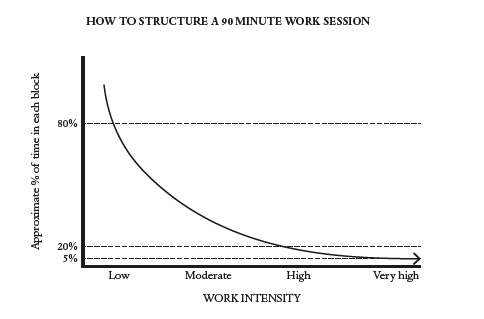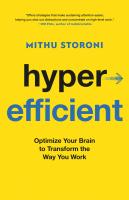How to structure a work session
Excerpt from HYPEREFFICIENT by Mithu Storoni
It would make sense to schedule work sessions that are around ninety minutes long, though this timing can be modified depending on how tired you feel, the time of day, and the kind of work you are doing. (If you are working later in the day with depleted mental resources, a sixty‑minute session may be better.) By the time you hit the end of your session, your mind may already be drifting into gear 1 mode as it winds down to catch its breath. This is the time for you to take a break and recharge.
Because your mind is freshest at the start of each ses‑ sion, you could aim to do 80 percent of the most complex, mentally demanding work in the first 20 percent of your sixty‑ to ninety‑minute work session, and the least demand‑ ing work in the latter part of each session. If you have mul‑ tiple tasks to get done during a single session, it helps to rank them from taxing to easy and do them in that order. If your hardest task takes longer than about twenty min‑ utes and you find your pace starting to sag, it might help to put it aside until the start of your next work session, when your mind is refreshed.
On this basis, each work session would look something like this:
- Perform the hardest tasks in the first twenty minutes.
- Do slower, easier work for the remaining forty to seventy minutes.
- Take a break for ten minutes.
- Repeat.

In general, you should limit intense mental work to no more than four hours a day in total. When you work intensely for longer, your mind is left so tired that it cannot recover after a night of rest and your fatigue is carried over into the next day, adding to that day’s load.

